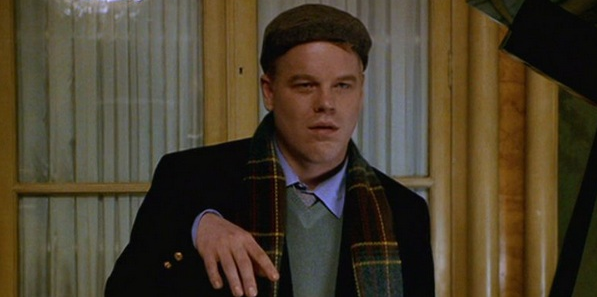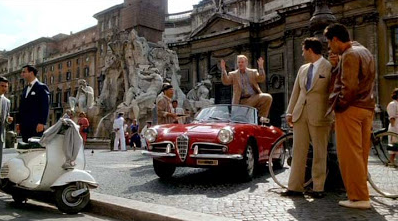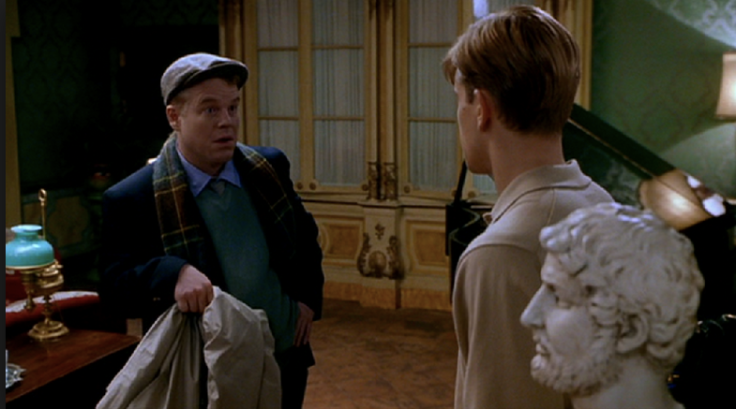This month marks the two-year anniversary of the death of Philip Seymour Hoffman, unquestionably one of the great actors of the past 20 years or so. In fact, he passed away on February 2nd, Groundhog Day — entirely the wrong day for an actor who pretty much never repeated himself on film.
To mark his passing, I thought I would write a little about a scene from the first film in which I really sat up and took note of Hoffman. I remember enjoying him in Twister, and certainly he left an indelible impression as the unfortunate Scotty J. in Boogie Nights. But it was as Freddie Miles in The Talented Mr Ripley that Hoffman really burst into my consciousness.

The film itself is fantastic — a dark and decadent, albeit sun-drenched, wallow through the tangled lives of the beautiful sons and daughters of 1950s privilege. Director Anthony Minghella (another name from the ‘gone too soon’ file) does a brilliant job of capturing the glamour, and the sadness, of the moneyed young Americans lounging around Italy in hiding from their parents, and the sociopath who slinks amongst them. The cinematography is lush, the tailoring is impeccable, and each scene is infused with just the right amount of Patricia Highsmith’s unnerving, free-floating menace.
It’s a film that takes its time, especially in its early stages. It’s not in a rush to get anywhere, and we are happy to glide along with it, lingering in gorgeous ancient apartments, on verandas, in side-streets and on terraces, just drinking it all in, just as our titular interloper (Matt Damon) is doing. As Ripley gazes bashfully, through owlish spectacles, upon the almost laughably handsome Dickie Greenleaf (Jude Law), we see wheels turning in his head but we also enjoy the pristine, Garden of Eden quality to their friendship.
Until the arrival of Freddie Miles. And what an arrival.

He shatters Tom and Dickie’s idyllic little existence, bursting their bubble of intimacy in one of the most garish, spectacular (but utterly appropriate) character introductions of all time. He roars up in a bright red sports car, blaring jazz, sashays across a piazza ogling women as he goes, strides up to Tom and Dickie’s table, throws an entire drink down his throat, and leads them off — one arm casually thrown over Dickie’s shoulder — to a restaurant where he has made a reservation. Eden is no more. The serpent has arrived. And he seems hungry.
As Freddie, Hoffman brings a dose of serious perspective to Tom and Dickie’s dynamic. In an instant, Dickie withdraws from Tom, as if he hadn’t really seen his ‘friend’ clearly until seeing him through Freddie’s scathing eyes. Freddie SEES Tom, and Tom squirms as he feels himself being seen.
Where Dickie has been blithely accepting, brimming with backslapping bonhomie, Freddie — for all his swagger — is altogether more cautious. He may be a boor, but he is a man of the world, and he’s got Tom’s number. Just as surely as he slammed the brakes on that red convertible, so he puts a halt to whatever may have been happening (or going to happen) between these two young men. He brings the world crashing in, and of course Tom despises him for it.
Freddie casts a large shadow, in every respect. He’s like a big, ruddy, red-headed deity, sitting in judgment over these two callow blonde youths. His laugh is dripping with scorn. His eyes penetrate, like little squinty X-rays. Out on a boat trip, he catches Ripley spying on Dickie and Marge (Gwyneth Paltrow) as they roll in the hay below deck, and he skewers him with that unforgettable line, “Tommy. How’s the peeping?”
The Small Moment comes later, though, and it involves a piano. Freddie has been absent for a good chunk of the film, but just as Ripley is thinking he might have got away with his crime, here comes ol’ laser-eyes, knocking at the door, and like some sort of flamboyant, snide Columbo he delights in picking apart the threads of Tom’s story. Toying with him like a fat ginger cat with a mouse.
Ripley keeps evading, both verbally and physically. He changes the subject. He moves from room to room. He tries to keep things light, superficial and vague. But Freddie doesn’t do vague. Again and again he moves to pin Ripley down, to catch him in a lie.

Which brings us to the piano.
Of course, it was a piano that got the whole story started. In the film’s very first scene, Tom plays at a swanky New York party, accompanying a singer performing an aria on a rooftop overlooking Central Park. One of the guests approaches Tom, having spotted his (borrowed) Princeton jacket, says “You probably know my son, Dickie. Class of ’56.” And in that moment, Herbert Greenleaf unknowingly dooms his son to a grisly death.
Flash-forward to Rome, to Freddie and Tom squaring off in Dickie’s apartment. Freddie moves to the piano, causally (of course!) tosses his Columbo coat over it, and begins to play. Only he doesn’t play a tune. He stabs one key, again and again. He has no music in him, he only has focus.
Freddie is not playing the piano. he is playing Tom.
We have identified Tom with the piano from the start, and the two do share a certain delicate, wooden, tightly wound quality. As Freddie stands there, one hand dangling from a limp wrist, the other jabbing again and again at that one high note, he just wants facts. Where’s Dickie? Are you living here? To Tom, who contains well over 88 different keys, these are rude, direct questions, and he has no answer. He can only mutter something about it being a new piano. “You probably shouldn’t…” And Freddie’s response is to hit the key harder, rolling his eyes as he does so. No-one tells Freddie Miles what he shouldn’t do. As Damon watches Hoffman at the piano, as he levels his eyes and sets his jaw in that peculiar, grimacing sour smile, as the non-diagetic score picks up the plinking piano, can’t let it go, so we see that Freddie’s fate is sealed.
I think of this as being the central scene of the film. In it, Tom is forced to stop running, to stop evading, to stop pretending. He is someone who places a lot of value on things being left unsaid, on shades of grey, on a certain kind of mutability that allows him to survive. Freddie, jabbing at that piano key, demands clarity. In his oafish, obvious way, he wants answers. Doesn’t he see that pinning things down spoils all the fun? Doesn’t he see that he’s blundering in and turning on all the lights just as the party was getting good?

Great post. The Talented Mr Ripley was one of my favourite books as a teenager, and I was lucky enough to be working at Buena Vista when we released the film in early 2000. Although I find some aspects of the film slightly problematic, it is a joy to look at and Philip Seymour Hoffman’s performance as Freddie Miles is pretty much perfect.
LikeLike
That’s awesome. Would you mind sharing more details about its production?
LikeLike
Wonderful analysis! It’s an absolutely magnificent movie – in every respect. Although Minghella became very famous as a director, his writing is what truly made him a master. He will be dearly missed (just like P.S. Hoffman – and, meanwhile, James Rebhorn).
LikeLike